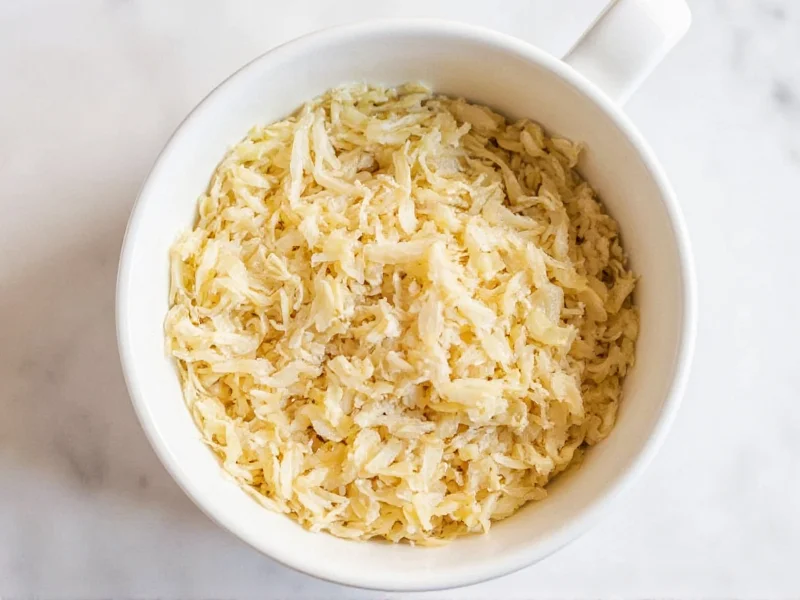When you're mid-recipe and realize you're out of dried onion flakes, knowing reliable substitutes can save your dish. Dried onion flakes provide concentrated onion flavor with subtle sweetness and convenient shelf stability. Understanding their culinary properties helps you select the best alternative for your specific cooking needs.
Understanding Dried Onion Flakes
Dried onion flakes are thinly sliced onions that have been dehydrated to preserve flavor and extend shelf life. They rehydrate during cooking, releasing a sweet, mellow onion flavor without the sharpness of raw onions. Unlike onion powder, which is finely ground, flakes maintain some texture that can be desirable in certain dishes like meatloaf, casseroles, and salad dressings.
Top 5 Dried Onion Flakes Substitutes
| Substitute | Conversion Ratio | Best For | Flavor Notes |
|---|---|---|---|
| Fresh onions | 3 parts fresh = 1 part dried | Soups, stews, sautéed dishes | Stronger raw flavor, adds moisture |
| Onion powder | 1/4 tsp powder = 1 tbsp flakes | Dry rubs, spice blends, baked goods | More concentrated, no texture |
| Shallots | Same as fresh onions | Delicate sauces, dressings | Milder, slightly sweeter |
| Onion salt | 1 tsp = 1 tbsp flakes (reduce salt) | Meat dishes, savory snacks | Salty flavor, convenient |
| Frozen onions | 1:1 ratio | Cooked dishes requiring texture | Closest to fresh, no prep time |
How to Choose the Right Substitute
Selecting the best dried onion flakes alternative depends on your specific recipe requirements. For soups and stews, fresh onions work exceptionally well as they have time to soften and blend flavors during cooking. When looking for dried onion flakes substitute in soup, use yellow onions for robust flavor or sweet onions for milder dishes.
In baking and dry mixes, onion powder provides the most consistent results without adding moisture. The dried onion flakes vs onion powder conversion is critical here—use 1/4 teaspoon powder for every tablespoon of flakes to avoid overpowering your dish.
For dishes where texture matters, like meatloaf or casseroles, frozen onions make the best substitute as they maintain some structure during cooking. If you're wondering what can I use instead of dried onion flakes in recipes requiring visible onion pieces, frozen onions or finely chopped fresh onions (sautéed first) work well.
Special Considerations for Common Recipes
For salad dressings: Shallots provide a more delicate flavor that won't overpower other ingredients. Use the same quantity as dried flakes but mince them finely.
For meat rubs: Onion powder works best as it adheres well to meat surfaces. Remember the dried onion flakes to onion powder conversion—use less powder to avoid overwhelming saltiness if using onion salt.
For baked goods: Onion powder is preferable as fresh onions would add unwanted moisture. When seeking dried onion flakes alternative for baking, reduce liquid in your recipe by 1-2 teaspoons per tablespoon of fresh onion substituted.
Avoiding Common Substitution Mistakes
Many home cooks make these errors when replacing dried onion flakes:
- Using equal amounts of fresh onion without adjusting for moisture content
- Not accounting for the stronger concentration of onion powder
- Adding substitutes too late in the cooking process
- Forgetting to adjust salt when using onion salt
When determining how to replace dried onion flakes in recipes, remember that dried ingredients are typically 3-4 times more concentrated than fresh. For the most accurate fresh onion to dried onion flakes ratio, use 3 tablespoons of finely chopped fresh onion for every 1 tablespoon of dried flakes.
Storage Tips for Substitutes
Proper storage maintains substitute quality:
- Store fresh onions in a cool, dry place away from potatoes
- Keep onion powder in an airtight container away from light
- Freeze chopped fresh onions in portion-sized containers
- Label all substitutes with dates to track freshness
Creating Your Own Dried Onion Flakes Substitute
If you frequently need homemade dried onion flakes substitute, try this simple method: thinly slice fresh onions, toss with 1 teaspoon of salt per onion to draw out moisture, then dehydrate at 140°F for 4-6 hours until crisp. Store in an airtight container for up to 6 months. This gives you control over flavor intensity and avoids preservatives found in commercial products.











 浙公网安备
33010002000092号
浙公网安备
33010002000092号 浙B2-20120091-4
浙B2-20120091-4